Aries Civil Testing Lab, located in Dubai, UAE, is a specialized testing laboratory mainly focused on Geotechnical Investigation and Civil/Construction-associated testing. We are proud to be accredited by the Emirates International Accreditation Centre (EIAC) in accordance with the International Standard ISO/IEC 17025:2017, demonstrating our competence in conducting tests.
Our organization is comprised of dedicated and enthusiastic professionals who are committed to delivering the highest quality services tailored to our client's specific requirements and project needs.
At our Testing Lab, we prioritize accuracy, reliability, and the timely delivery of test results. Our team of experts generates detailed reports and provides actionable recommendations based on the test findings. We work closely with our clients to gain a thorough understanding of their project objectives, allowing us to offer customized testing solutions.
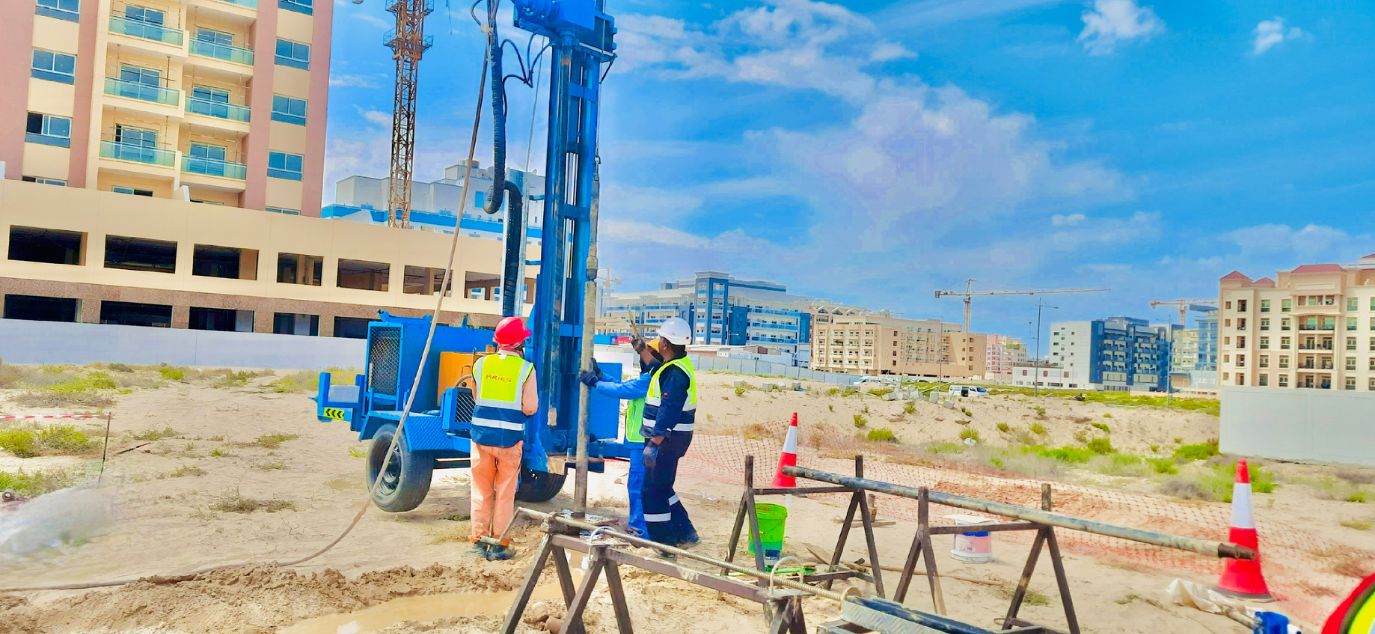
Our laboratory offers a wide range of testing and engineering services to support various industries, including but not limited to:
Whether you are involved in infrastructure development, building construction, or any other construction-related activity, our lab is here to support you with high-quality geotechnical and civil testing services. Trust Aries Civil Testing Lab for accurate and reliable results to ensure the success and safety of your projects.
Civil engineering projects, including the construction of buildings, bridges, earthen dams, and roadways, require a thorough understanding of the subsurface conditions. Conducting geotechnical investigations is an essential step in the design process, as it provides crucial information about the soil's capacity to support the proposed structures.
At Aries Testing Laboratory, we specialize in providing comprehensive geotechnical investigation services. Our goal is to assess the subsurface conditions, evaluate the soil's load-bearing capacity, and recommend suitable foundation solutions. With state-of-the-art drilling and sampling equipment, we ensure accurate data collection using the latest technologies.
Our team consists of highly qualified and experienced geotechnical engineers, geologists, and drillers who bring their expertise to every project. They analyse the collected data to determine the most appropriate foundation type, whether it be shallow or deep, based on the specific requirements of the project.
Our services include, but are not limited to, the following:
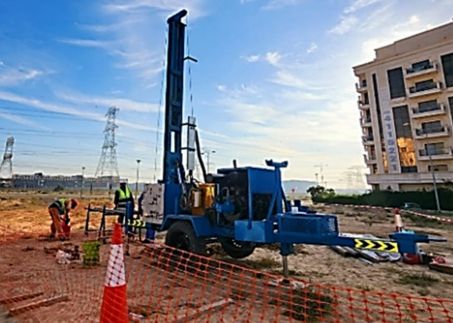
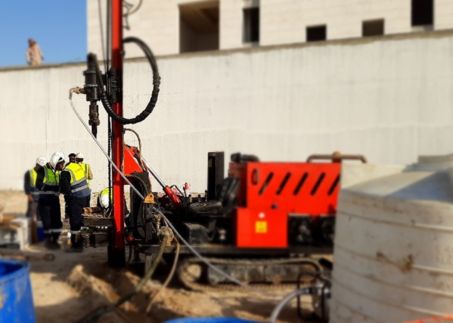
Aries Civil Testing Lab is an accredited laboratory equipped to deliver fast and reliable materials testing results. Our qualified engineers and technicians conduct on-site and laboratory tests on construction materials to ensure compliance with required specifications and standards.
We possess a range of well-maintained and calibrated testing equipment, adhering to ISO/IEC 17025:2017 standards. Our comprehensive testing services help industries meet complex building standards and regulations, minimizing risks and ensuring the longevity of their assets.
We perform the different construction materials testing in accordance with BS, BS EN ISO, ASTM, AASHTO, DIN, CIRIA, etc.
Soil is formed from rocks, organic matter, minerals, air, and water. Its quality varies based on composition, strength, and type. Poor soil quality poses challenges for builders. Assessing land suitability and soil capacity before construction is crucial. Analysing factors like surface texture, permeability, water table, erosion hazard, and soil depth helps determine soil quality and limitations. Builders gain insights into soil suitability and identify potential issues.
An overview of Soil testing services is listed below:
Concrete is a composite material composed of fine and coarse aggregate bonded together with a fluid cement (cement paste) that hardens (cures) over time. Concrete is the second-most-used substance in the world after water, and is the most widely used building material.
An overview of Concrete testing services is listed below:
Fresh Concrete TestsAggregates are inert granular materials such as sand, gravel, or crushed stone that, along with water and Portland cement, are essential ingredient in concrete.
An overview of Aggregate testing services is listed below:
Asphalt, also known as bitumen, is a sticky, black, and highly viscous liquid or semi-solid form of petroleum. It is a crucial component in the construction industry, primarily used for paving roads, highways, airport runways, and parking lots.
An overview of Asphalt testing services is listed below:
Aries is well equipped to determine the mechanical properties of materials and solve a wide variety of technical problems for the industry.
Flooring is a term used to describe the permanent covering of a floor, including materials such as ceramic tiles, marble, granite, and dimension stones. Before installing flooring materials, it is important to conduct standard laboratory tests to assess their quality.
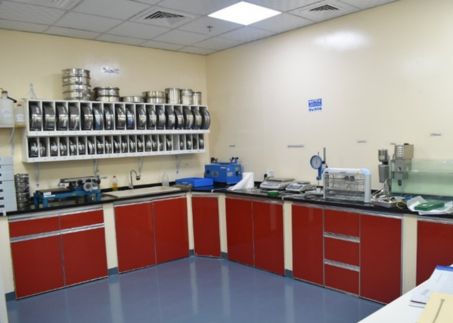
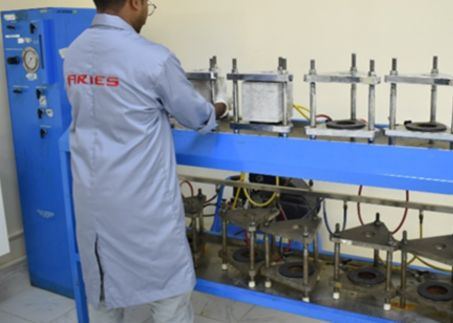
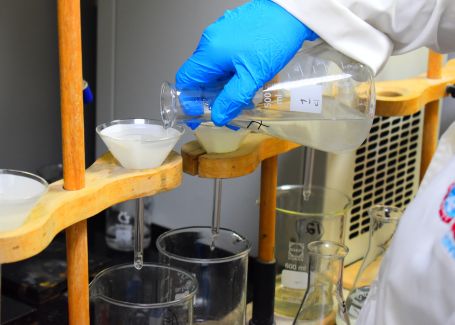
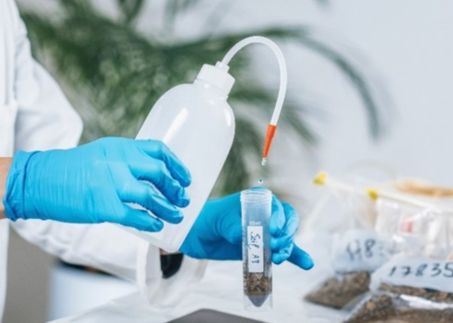
Chemical testing is essential for regulatory compliance and to assess the quality and composition of chemical substances and materials found in products, construction materials, industrial processes, and manufacturing. Our Chemical department collaborates closely with our Geotechnical and Material departments. Our team of experienced and highly qualified chemists utilizes a comprehensive range of instruments. Our laboratory is fully equipped to prepare samples and standards for various analyses of liquid and solid samples.
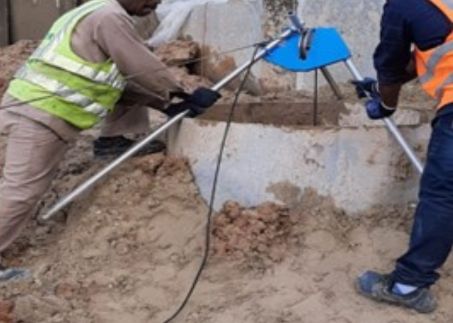
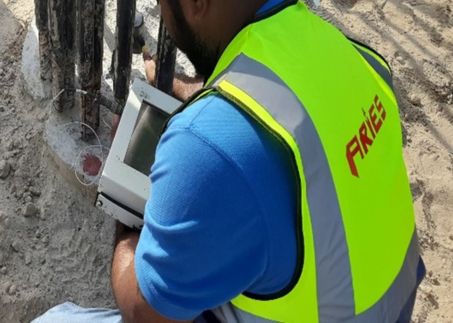
Aries Civil Testing Lab is an accredited laboratory equipped to offer efficient and timely pile testing services. Pile load testing is a direct approach to determining the ultimate geotechnical capacity of a pile. Dynamic load testing, Cross-hole Sonic Logging, Mechanical Calliper Logging and Low Strain Pile Integrity test, provides a reliable way to assess the condition of piles or shafts and evaluate the bearing capacity of a pile.
An overview of Pile testing services is listed below:
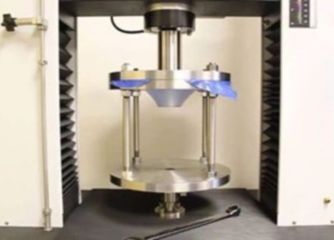
Geotextiles are permeable geosynthetic materials comprised of textiles. They are utilized in Geotechnical Engineering to integrate with foundation, soil, earth, and rock materials. Geotextiles serve various purposes in civil engineering projects, including erosion protection, soil and slope stabilization for roads, pavements, bridges, embankments, and retaining walls. They enable water to pass through while preventing the movement of soil and other materials.
A waterproofing membrane is a water-tight layer of material that is applied to a surface to prevent water leaks and damage. The waterproofing process commonly involves using liquid-applied or pre-formed sheet membranes. When there are issues with waterproof membranes, it is often beneficial to conduct a water sample analysis as an initial step to determine the source of leaks.